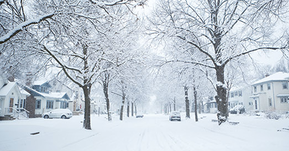
Winter storms can bring cold temperatures, power failures, loss of communication services, and icy roads. To keep yourself and your loved ones safe, you should know how to prepare your home in advance.
2. Turn up the heat. Are the leaves dropping off the trees? Is it sweater weather? Now’s the time to make sure your furnace is in good running condition. To-dos: Change your furnace filter every four months (every two if you have pets). Install a programmable thermostat. Reverse the direction of your ceiling fans so they direct warm air downward.
3. Stop ice dams before they start. Ice dams occur when snowmelt freezes on the edge of your roof. If it happens repeatedly, you run the risk of roof leaks and water damage. To-dos: Clean out your gutters and downspouts. Seal around vent pipes, exhaust fans, and attic hatches. Clear soffit vents. Install snow and ice slides on your roof. Add insulation to your attic floor.
4. Check your chimney. Before you curl up by the fire this winter, check your chimney—creosote and critters have a way of building up inside it. To-dos: Have a chimney sweep and give your fireplace or wood stove a good cleaning. Keep the flue closed when you’re not using the fireplace. Install a chimney inflatable to block cold air and retain warm air.
5. Mind the gaps. Cold air can seep in from the tiniest gaps. Caulking and weather-stripping around windows and doors keep cold and condensation at bay and boost your home’s energy efficiency. To-dos: Check windows and doors and caulk or weather-strip as needed. Upgrade to double- or triple-pane windows and insulated doors or add storm windows and doors.
6. Prepare for emergencies. What’s inevitable in winter besides ice and snow? Power outages. That’s why it’s smart to have emergency supplies on hand. A family communications plan is a good idea, too. To-dos: Stock up on sand, ice melt, candles, lighters, water, canned goods, and shovels. Check the charge on your fire extinguisher. Invest in a back-up generator.
7. Check CO detectors. Each year, over 400 Americans die from accidental carbon monoxide poisoning and thousands more are hospitalized, according to the CDC. The risk of CO poisoning spikes in the winter. To-dos: Check your carbon monoxide detectors and replace batteries as needed. Never run a generator, grill, or similar device in or near your home. Keep them 20 feet from doors and windows. If your CO alarm sounds, go outside or open windows and doors.
We have been helping homeowners with insurance coverage for over 60 years. We will help you get the best coverage for your needs. Reach out to us if you would like more information at 201-796-1881.



 RSS Feed
RSS Feed


